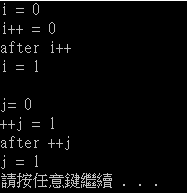i++與++i是不一樣的兩個東西:
i++:先使用i的值,再將i的值+1
++i:先將i+1,再使用i的值。
++i會比i++有效率,因為執行i++時,編譯器會需要產生出一個temp用來暫存i的植,指令也因此增加,也因此當反覆執行很多次的時候,++i的效率會比i++來的快。
本文以C++實作介紹。
i++:
int temp;
temp = i ;
i = i+1;
return temp;
++i:
i=i+1
return i;
實作程式碼:
#include <iostream>
using namespace std;
int main() {
int i = 0;
int j = 0;
cout << "i = " << i <<endl;
cout << "i++ = " << i++<<endl;
cout << "after i++ \n" <<"i = "<< i <<"\n"<< endl;
cout << "j= " << j << endl;
cout << "++j = " << ++j << endl;
cout << "after ++j \n"<<"j = " << j << endl;
system("pause");
return 0;
}
執行結果如下:

有夢最美 築夢踏實
活在當下 認真過每一天
我是阿夢 也是Ace